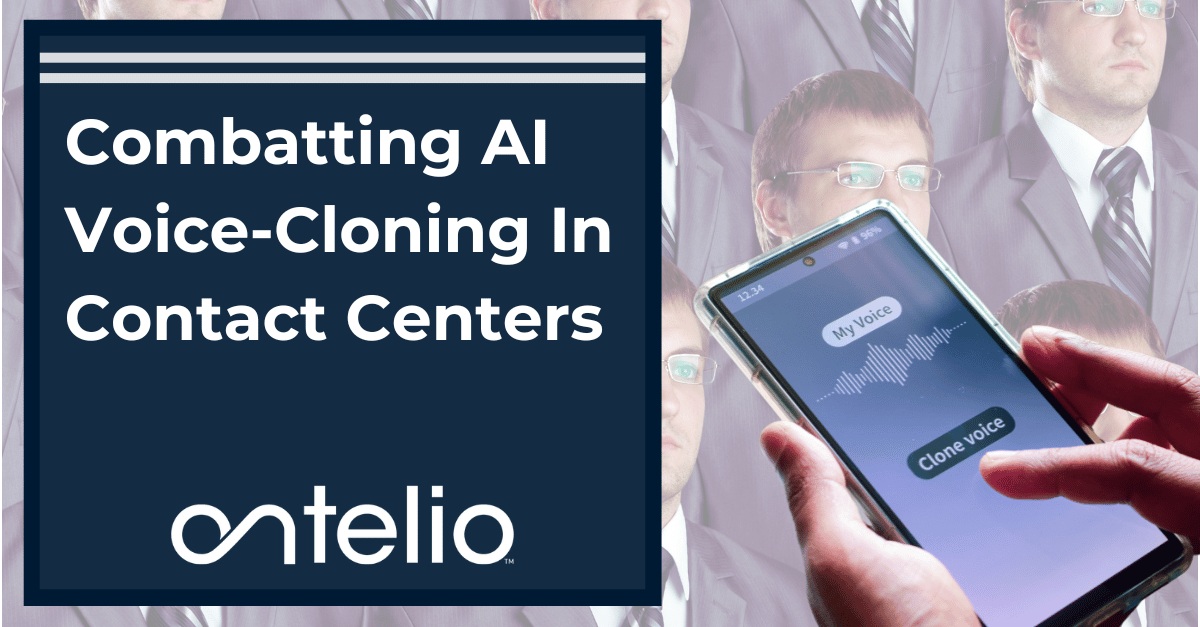Combatting AI Voice-Cloning with Ontelio’s Redaction Solutions
The rise of AI voice-cloning technology has introduced new challenges for cybersecurity, leaving financial institutions and consumers vulnerable to...

In today's business landscape, marked by an increasingly data-centric approach, the role of the contact center has evolved into a pivotal bridge connecting corporations with their clientele. This vital juncture serves as a repository of invaluable insights gleaned from customer interactions, preferences, and feedback. Organizations harness this rich vein of data through sophisticated customer experience analytics, aiming to refine their offerings, services, and overall engagement tactics. Nonetheless, this quest for analytical clarity must adeptly maneuver through the intricate terrain of data privacy and security, especially concerning Personally Identifiable Information (PII), Payment Card Information (PCI), and Protected Health Information (PHI). The imperative to redact these sensitive data categories from call recordings and transcripts prior to their analytical application transcends mere compliance with regulatory mandates; it is a cornerstone of a business strategy that prioritizes trust, reputation stewardship, and the assurance of secure customer interactions. This discourse explores the fundamental reasons why adopting such a practice is paramount for organizations dedicated to sustaining a competitive edge in today's market.
Navigating the complex legal and regulatory landscape is paramount for enterprises handling sensitive customer information. The implementation of rigorous frameworks like the General Data Protection Regulation (GDPR) in the European Union, the California Consumer Privacy Act (CCPA), and the Health Insurance Portability and Accountability Act (HIPAA) in the United States, has elevated the standards for data privacy. These laws compel organizations to protect customer data rigorously, ensuring it remains secure from unauthorized access and exploitation. Failure to comply with these regulations can lead to substantial financial penalties, legal consequences, and significant damage to a company's reputation. Through the meticulous redaction of PII, PCI, and PHI from call records, enterprises can meet these stringent regulatory requirements. This proactive approach not only mitigates the risk of legal disputes and financial sanctions but also reinforces trust and integrity within customer relationships.
In today's era, marked by frequent data breaches, customer trust emerges as both a precious and fragile commodity. The modern consumer, more informed and concerned about their data privacy than ever before, demands not just exceptional service from businesses but also stringent protection of their sensitive information. By implementing redaction processes to remove sensitive data from call recordings, companies can significantly reassure customers about the security of their personal data. This act of safeguarding customer information plays a pivotal role in strengthening trust and loyalty, serving as the bedrock of enduring customer relationships. It is an essential factor in boosting customer retention and maximizing the lifetime value of each customer.
The threat of data breaches presents a significant challenge to enterprises, potentially resulting in severe financial setbacks, damage to reputation, and disruptions in operations. Recordings of calls that contain PII, PCI, and PHI that are left unredacted become lucrative targets for cybercriminals. Through the proactive redaction of such sensitive data, companies can greatly diminish the appeal of these recordings to malicious entities, effectively reducing the likelihood of data breaches. Implementing such a proactive data protection approach is critical in today's digital landscape, where the incidences and costs associated with data breaches are on a relentless upward trajectory. This strategic emphasis on preemptive security measures underscores the importance of safeguarding sensitive information, thereby fortifying the enterprise against the pervasive risks posed by data breaches.
The primary objective of analyzing call recordings is to extract meaningful insights into customer experiences, their preferences, and the challenges they encounter. While sensitive personal information is vital for transactional activities, it does not add value to this analytical pursuit. Through the process of redaction, attention is directed exclusively towards pertinent information that significantly impacts customer experience improvement efforts. Additionally, this practice refines data processing and analytics workflows, enhancing their efficiency and effectiveness. By eliminating extraneous data, organizations can heighten the precision of their analytics, culminating in more strategic decisions and well-crafted strategies.
Ethical considerations in data management have become a critical focal point, as stakeholders across the board are calling for more responsible and conscientious business practices. In this context, the redaction of sensitive information from call recordings emerges as a pivotal measure, aligning seamlessly with prevailing ethical norms and societal expectations concerning privacy and data protection. This act of redaction not only underscores a company's dedication to upholding high ethical standards but also cements its status as a trustworthy steward of personal and sensitive information. Such a commitment to ethical data practices is especially crucial in sectors like healthcare and finance, where the safeguarding of PHI and PCI is not just a regulatory requirement but a fundamental expectation. Engaging in rigorous data redaction practices thus serves as a testament to an organization's commitment to ethical integrity, bolstering its reputation and strengthening the trust placed in it by clients, customers, and regulatory bodies alike.
The process of removing Personally Identifiable Information (PII), Payment Card Information (PCI), and Protected Health Information (PHI) from contact center call recordings and transcripts before employing them in customer experience analytics represents a complex strategic necessity. It not only guarantees adherence to rigorous data privacy regulations but also bolsters customer trust, diminishes the risk of data breaches, sharpens the focus of analytical endeavors, and upholds ethical data usage standards. Within the fiercely competitive milieu of the 21st century, these factors transcend the realm of mere regulatory compliance, forming the bedrock of a resilient, trust-centric relationship with customers. As businesses wade through the complexities of data-driven decision-making, the diligent redaction of sensitive data from analytical processes shines as a guiding principle, paving the path towards secure, customer-focused business paradigms.
Within this complex environment, Ontelio emerges as a critical solution, delivering state-of-the-art data redaction capabilities with an impressive accuracy rate exceeding 99.97%*. Ontelio's advanced technology provides a robust mechanism for securely managing sensitive information, thereby playing a vital role in safeguarding privacy and compliance across various industries. Ontelio's suite, equipped with 76 pre-built entity types and context-aware detection, ensures comprehensive data protection and regulatory compliance. By accurately identifying and redacting sensitive information in real-time, while preserving the utility of non-sensitive data, Ontelio facilitates businesses in navigating high-volume, high-velocity data streams securely. Whether deployed on-premise or through a managed public cloud, Ontelio's versatility and efficiency make it an indispensable asset for enterprises striving to maintain a competitive edge in today's data-centric world.
*Each clients data is unique and actual results may vary.

The rise of AI voice-cloning technology has introduced new challenges for cybersecurity, leaving financial institutions and consumers vulnerable to...

Contact centers must efficiently manage vast amounts of customer interactions while ensuring compliance with strict data privacy regulations. AI...

In the age of AI and data-driven insights, businesses face the dual challenge of leveraging vast amounts of data for customer experience (CX)...